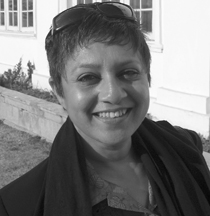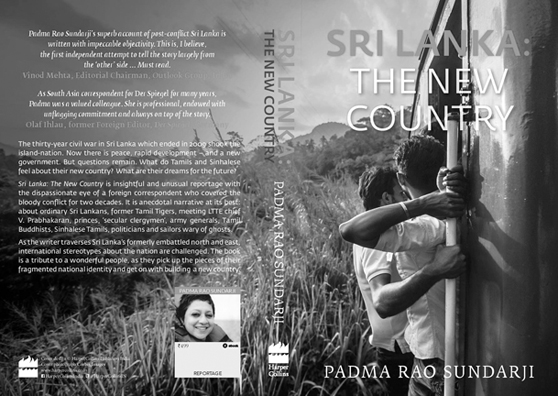Unabashedly partial to Sri Lanka
Padma Rao Sundarji, author of Sri Lanka: The New
Country in conversation with Dilshan Boange
The aftermath of a civil war brings
out a body of literature that includes many genres of writing to discuss
and reflect on the tragedy of war and its effects on people. One of the
latest works about the separatist war that waged in the North of Sri
Lanka is Sri Lanka: The New Country by Padma Rao Sundarji, a seasoned
Indian journalist who has done extensive reporting on Sri Lanka. Her
years of exposure to the war from both political and social angles gave
her the mettle and direction of how she should, and would, write her
book on this subject offering insights and investigations to voice
diverse perspectives.
In this feature interview Padma,
who has worked as the South Asian Bureau chief for the reputed German
news magazine Der Spiegel for many years, brings to light her outlooks
about how journalistic integrity should be maintained without succumbing
to pressures and portray with accuracy the issues for what they actually
are and not what they can be 'marketed' to meet 'international' popular
perceptions. She also gives insights about how, while getting to know
various segments of Sri Lankan society in the course of her work, she
was conscious of the challenging role that faced her being a foreign
reporter dealing with a highly sensitive topic without compromising the
sanctified journalistic virtue of impartiality.
 Q:
Before going into the matter of your book, can you tell us about what
made you become a writer and a journalist, and the influences that have
shaped your career in writing? Q:
Before going into the matter of your book, can you tell us about what
made you become a writer and a journalist, and the influences that have
shaped your career in writing?
A: Essentially, a passion for writing and an urge to
communicate: to talk to people, to experience events first-hand. And to
stay true to what they say and what I see in my reportage, never mind
whether it contradicts populist belief or not.
I have been fortunate to work under some great journalists who have
faithfully adhered to those tenets and not allowed their reportage or
coverage of events to be coloured by either political agendas or by
'trending' opinions. The latter is especially relevant in the case of
reportage on Sri Lanka throughout the war and beyond.
There is a certain international opinion that a) Sri Lanka must be
censured b) its assurances of its own investigation into war crimes
suspected and ignored, c) Sri Lankans are incapable of solving their own
problems and must therefore allow foreigners to do it for them and d)
that there IS, never mind what thousands of residents of the country
say, indeed an 'ongoing genocide'. The more I read biased reporting
-especially in the western media but also by liberal, western educated
elite writers in South Asia - the stronger my resolve to turn the coin
over, show the other side in whatever I cover.
Q: You are more than the average visitor to Sri Lanka. The
country's current affairs have been of much significance to your work.
In this regard how do you see your own relationship with Sri Lanka?
A: Much of my book, Sri Lanka: The New Country' showcases my
own - unabashedly partial - relationship to Sri Lanka.
Please note, the emphasis is on Sri Lanka, not on the government of
this, that or another president or prime minister. Through all these
decades of covering the civil war, then the terrifying tsunami and all
other current affairs in your country, I have received unlimited and
ready help from all quarters: civil society, politicians, the armed
forces - even the Tigers at the time - without demanding editorial
compromise in return.
Consequently, it's always baffling to hear other foreign reporters
speak of curtailed press freedom, of being watched, followed, censored,
etc. From the governments of Presidents Kumaratunga to Rajapaksa to the
current one of President Sirisena: in my nearing two decades of
reporting out of Sri Lanka, I have never been obstructed in my work. And
this despite the fact that I have at many times criticized both Colombo
and the Tigers fiercely and have received nasty letters from both
Sinhalese and Tamil chauvinists in Europe, whose largest circulated
magazine, Der Spiegel was my longstanding employer. On a more personal
note, I feel at home in Sri Lanka, I am enchanted by its mercurial
skies, wonderful people, fantastic cuisine, gentleness with strangers.
And yet, I am very conscious and aware that at the end of the day, I am
and will remain, a foreigner.
It is for this reason that it never ceases to amuse me to read the
-thankfully few - clueless reviews of my book which insist, without
reading the book carefully, that if I see anything positive in post-war
Sri Lanka then it can only be because I 'like Mahinda Rajapaksa'. This
is absurd beyond belief. Rajapaksa happened to be the president during
the longest tract of my covering Sri Lanka. He is widely credited -
including by many top ministers in today's government just before their
victory in January - with being the first president to succeed in ending
the civil war. Of course, there are corruption charges directed against
him and his family and investigations are underway. But that is a purely
domestic matter and has very little to do with a foreign reporter
traversing through the North and East and reproducing conversations with
ordinary people about how they feel in post-war Sri Lanka.
I don't vote there, I am an Indian citizen, so the jeering accusation
by naysayers that oh I must love Rajapaksa if I say one good word about
him, or oh, I must adore Kumaratunga to say that her 'CBK proposal' was
one of the best political proposals for the Northern Province, is just
downright silly.
 The
truth is: if any writer dares write a single good thing about Sri Lanka,
he or she, according to the millions of 'Sri Lanka experts' around the
world, is 'denying the truth'. The
truth is: if any writer dares write a single good thing about Sri Lanka,
he or she, according to the millions of 'Sri Lanka experts' around the
world, is 'denying the truth'.
Q: When did you actually start the base to write your book
'Sri Lanka: The New Country'?
A:It was around late 2009, when I fell seriously ill and could
not travel for about ten months. It was the first time in decades that I
was not heading to Sri Lanka every other month for a story. During that
period, I began to read the earliest post-war reports on Sri Lanka.
I was astounded to read repeatedly of 'continuing genocide', ongoing
torture, etc. I was also intrigued by the selectivity of the so-called
'interviews' I read with Sri Lankan Tamils. Were you to believe that
those were the only voices of Tamil Sri Lankans, you would easily accept
that all that they want - even after the devastating war which killed
120,000 people - is a separate Eelam. I began to wonder whether this was
really all true and was dying to return to Sri Lanka and see and hear
for myself.
In any case and as I mention above, I have mostly disdain for most of
the international media coverage on Sri Lanka. Be it on Sri Lanka under
Kumaratunga or Rajapaksa or Sirisena: there is an air of brazen
arrogance, of neo-imperialism, of typical western superiority that has
always marked international reportage on Sri Lanka. Please note: one
can't blame that tendency entirely and solely on separatist minded
sections of the Tamil diaspora resident in the west.
It is an obvious and highly annoying attempt by those countries
themselves to foist a one-size-fits-all western interpretation of
democracy on societies that are inherently and intrinsically different,
such as those in South Asia.
Precisely the same thing used to happen in the case of India. Right
up to the early nineties, reportage on India was dominated by unabashed
interference in internal affairs (in our case, the state of Jammu and
Kashmir) and mostly, 'hard-luck' stories on India: death, disease,
plague, destruction, brides being burned, female children being aborted,
etc. etc. It was the reinforcement of a clichéd picture of India, one
that orientalists were happy to keep alive. Not surprisingly, the tone
and rhetoric changed the minute India started opening up her giant
markets in the early nineties.
Today, there is hardly a mention of the K-word, neither in
international conferences, nor in the media. So the minute I recovered
and was allowed to travel, I drew up a proposal, sent it to my publisher
and found myself aboard the UL flight to Colombo again. It was the
happiest day in ten months.
Continued next week
|

